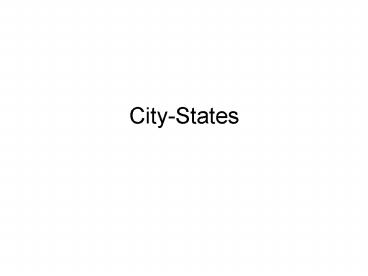CityStates - PowerPoint PPT Presentation
1 / 15
Title:
CityStates
Description:
... hold off the Persians for 3 days. The people of Athens fled to island ... Reason for Persian victory: traitor. Once to Athens, Persians burned the city. Salamis ... – PowerPoint PPT presentation
Number of Views:46
Avg rating:3.0/5.0
Title: CityStates
1
City-States
2
Polis
- Polis city-state, was the geographic and
political center of Greek life. - Acropolis fortified hill, was home to the local
temple god. - Agora Open area at the foot of the acropolis
used as a marketplace. - Members of the upper class settled nears the
agora and in time it was a city.
3
Polis Government
- Each city-state has its own government.
- Ave. 5,000-10,000 people per citizens per polis.
- Workers and slaves were not citizens.
- Only citizens could vote, own property, public
office, and speak for themselves in court. - Civic and personal honor were important.
4
Sparta
- Location Peloponnesus Peninsula of southern
Greece. - Founded by the Dorian's who had invaded.
- Economy was based on agriculture.
- They had no colonies, invaded others instead and
forced slave labor.
5
- Helots slaves of Sparta
- 650 B.C.E. Helots rebelled in a series of
revolts. - Outcome of the revolts was a military society.
6
Military Society
- Soldiers wanted to be the best.
- Women wanted military children.
- Didnt believe in city walls. Why?
- Only healthy babies were allowed to live. Rest
dumped along a hill. - 7 years old, boys began military training
(reading, writing, and weaponry)
7
- 20 years old, soldiers were sent to the frontier
areas. - 30 years old, expected to marry.
- Men stayed in barracks even when married.
- 60 years old, retirement.
8
Role of Women
- Women expected to be healthy and strong.
- Trained in gymnastics, wrestling, and boxing.
- Married at the age of 19 (most women then were
14) Why 19? - Had more rights then most Greek women. Go
shopping to market, attend dinners alone, own
property - No involvement in government.
9
War and Glory
- Journal What are some current conflicts in the
world today? - 400 B.C. Persian Empire was the worlds strongest
empire. - Greeks united and defeated the Persians.
- Greeks then turned around and fought themselves.
10
Persian War
- Ionia Geek Polis in Aegean Sea. Conquered by the
Persians. - Athens and other city-states helped Ionia in a
revolt over the Persians. - Unsuccessful revolt. Persian King (Darius I)
decided to attack the Greeks.
11
Battle of Marathon
- One of the most important battles in history?
Why? - Greeks outnumbered 20,000 to 10,000.
- Surprise attack When Persians were loading
their soldiers on the ships the Greeks ran down
the hills and after them. - 6,400 Persians died to around 192 Greeks.
12
Now What?
- Persians sailed back home.
- Shortly after, rich silver mines were found
outside Athens. - Athenians spent money on triremes for Persians
return. - When Persians returned 20 Greek city-states
united. Sparta-Army and Athens-Navy
13
Thermopylae
- Persians (Xerxes) did return at Thermopylae.
- Greeks hold off the Persians for 3 days.
- The people of Athens fled to island of Salamis.
- 300 Spartans and 700 other Greek soldiers fought
to the death. - Reason for Persian victory traitor
- Once to Athens, Persians burned the city.
14
Salamis
- Greeks trick Persians into sailing into the
strait between Athens and Salamis. - The triremes of the Greeks were no match for this
type of naval fighting. - Greeks defeated the Persians.
- Xerxes returned to Asia and left few soldiers in
Greece.
15
The end.
- In 479 B.C. the Greeks defeated the Persians in
the Battle of Plataea. - Wars were over.

